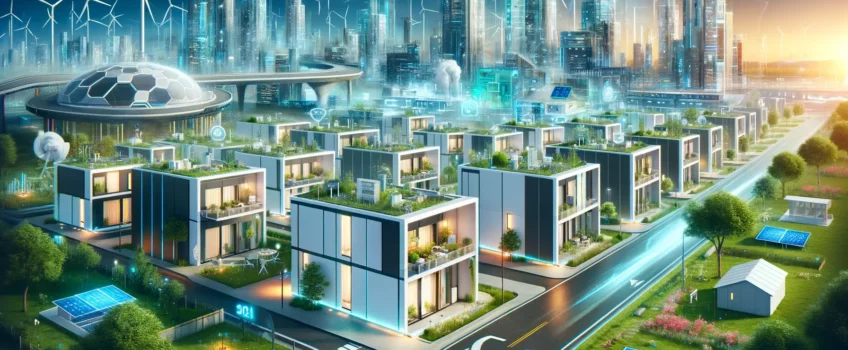
In a groundbreaking shift towards sustainable living, the latest report from Make UK Modular, in collaboration with Octopus Energy, has unveiled a significant public inclination for energy-efficient homes. This surge in interest paves the way for modular housing to take centre stage in the UK’s housing market, aligning with our commitment at PRV Engineering to provide precision-engineered solutions in construction and beyond.
Public Sentiment Swings Towards Eco-Friendly Homes
Recent research by Savanta, surveying 2,300 UK adults, shows a decisive turn towards environmentally conscious living. An impressive 60% of potential home renters and buyers now prioritise the environmental impact of their future homes, with a noteworthy 40% ready to invest more for this green privilege.
This trend is especially pronounced among the youth, with two-thirds of the 18-30 demographic willing to pay a premium for eco-friendly living spaces. This shift in demand is a clear indication of the growing awareness and concern for sustainability and energy efficiency in housing.
Modular Housing: The Sustainable Solution
Modular construction, also known as Modular Integrated Construction (MIC), is a pioneering building process where sections of a structure are constructed off-site in a controlled factory setting. These sections, commonly referred to as ‘modules’, are then transported to the construction site and assembled to form a complete building. This method stands in contrast to traditional construction, where the entire building process occurs on-site.
MIC leverages advanced manufacturing techniques, enabling precise control over quality, reducing waste, and shortening project timelines. It’s an innovative approach that aligns with the modern demand for efficiency, sustainability, and safety in construction.
Related: Reasons Why Modular Construction Is The Future
Modular Homes – A Keystone in Sustainable Housing
Modular housing emerges as a frontrunner in this eco-friendly revolution. Representing a fusion of cost-effectiveness and environmental stewardship, these homes not only align with the government’s net-zero emissions commitment but also promise substantial annual savings for families, potentially up to £1,000. Make UK Modular, a leading voice in modular construction, advocates for this innovative approach as a response to the current climate crisis.
Propelling the Green Housing Revolution Forward
To meet this rising demand, Make UK Modular urges governmental action. They propose a modernised stamp duty system, based on energy performance, alongside reforms in the Affordable Homes Programme and planning processes. These changes are crucial for fostering the growth of modular housebuilding, thus meeting the public’s appetite for environmentally sustainable housing.
Daniel Paterson, Make UK Modular’s Director of Government Affairs, encapsulates the moment: “We are on the brink of a green housing revolution. This movement isn’t just about the environment; it’s about reducing living costs for households. We are calling on the government to enact demand-side stamp duty reforms and to adjust the Affordable Homes Programme to accommodate modular builders.”
Decoding Modular Housing
Understanding modular homes is key to appreciating their potential. These structures represent a paradigm shift in construction, especially suitable for high-rise, urban settings. Their design integrates energy efficiency at its core, offering a sustainable alternative to traditional building methods. These factory-built housing units are assembled on-site, ensuring precision engineering and guaranteeing minimal material wastage.
Public Perception and the Road Ahead
Modular homes are widely regarded as a positive solution, with over 25% acknowledging their environmental friendliness, nearly 30% recognising their efficiency, and more than 35% appreciating their modernity.
Modular manufacturers can also construct environmentally-friendly homes at a competitive price, many of which achieve top energy performance ratings. This not only benefits the environment but also saves the average family up to £1,000 per year on energy bills.
These homes offer the promise of top energy performance, aligning with initiatives like Octopus Energy’s Zero Bills™ guarantee. The goal? To deliver 50,000 green, cost-effective homes by 2025.
Michael Cottrell, Zero Bills Home Director at Octopus Energy said: “The evidence is clear to see: greener homes are fast becoming hot property, and modular manufacturers are particularly well placed to deliver the revolution. When powered by Octopus’ industry-leading smart tariffs, these homes have the potential to radically lower energy bills for consumers – in some cases all the way to zero. We’re now calling on developers of all shapes and sizes to help us make greener, bill-free homes the new standard.”
Final Thoughts
What do you think of modular housing? Please share your comments in the section below or find us on Twitter, Facebook, YouTube or LinkedIn and use our new hashtag #PRVtech. For those who don’t know, PRV Engineering specialise in various industries including construction, structural and architectural steelwork, site work installation and maintenance, among others. Get in touch if you have any questions or if you need assistance with your projects.


 Mail:
Mail: 




